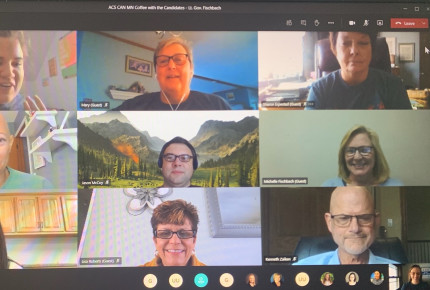Eagan, Minn.—Both major candidates for Minnesota’s 7th Congressional District, former Lt. Gov. Michelle Fischbach and Rep. Collin Peterson, have met virtually with cancer patients, survivors and volunteer advocates to discuss policies and issues that are critical to fighting cancer. The meetings were part of the American Cancer Society Cancer Action Network (ACS CAN) Cancer Votes campaign—the nation’s leading voter education program informing the public and candidates about the actions lawmakers should take to make fighting cancer a national priority.
“Cancer touches everyone. Just this year, more than 33,000 Minnesotans will hear the words ‘you have cancer’. Our elected officials have the power to help our family, friends and neighbors prevent and fight cancer through good policy,” said Sharon Erpestad, Windom resident and volunteer for ACS CAN Minnesota.
Throughout the campaign season, ACS CAN calls on Minnesota’s major 2nd and 7th Congressional Districts candidates to state their position on cancer issues such as cancer research funding and access to health care, including rural cancer care.
Specifically, candidates for the 7th Congressional District seat are being asked the following questions:
- Access to Health Care: The decision on whether or not to repeal the Affordable Care Act will be decided by the U.S. Supreme Court. If it is overturned, how do you think we should protect Americans with pre-existing conditions like cancer?
- Saving Lives through Cancer Research: Will you vote for annual increases in cancer research funding for the National Institutes of Health and the National Cancer Institute?
- Rural Health Care: Minnesotans in rural areas are often diagnosed with cancer at later stages, which have worse survivorship outcomes. They face unique challenges to cancer care including workforce shortages, long travel distances, lack of access to specialists, insurance obstacles, and less clinical trial access. If elected, how will you address the challenges of rural cancer care?
- Health Equity in Clinical Trials: Clinical trials are a critical step in advancing medical research, yet one in five trials fail due to lack of participation. Common barriers to enrollment include lack of transportation, or an inability to afford lodging or take time off work. Communities of color are particularly impacted by these barriers, leading to a lack of diversity in trial participants. What policy changes would you support to address these issues?
“Unfortunately, your zip code, race and income still play a major role in whether you survive this disease,” said Kayla Hawkinson, Chokio resident and volunteer for ACS CAN Minnesota. “Cancer mortality rates, for example, remain higher in rural versus urban areas. It’s important for voters to know the candidates’ plans to address these disparities.”
View the conversation with former Lt. Gov. Fischbach on Friday.
ACS CAN is strictly non-partisan and does not endorse, oppose, or contribute to any candidate or political party.

